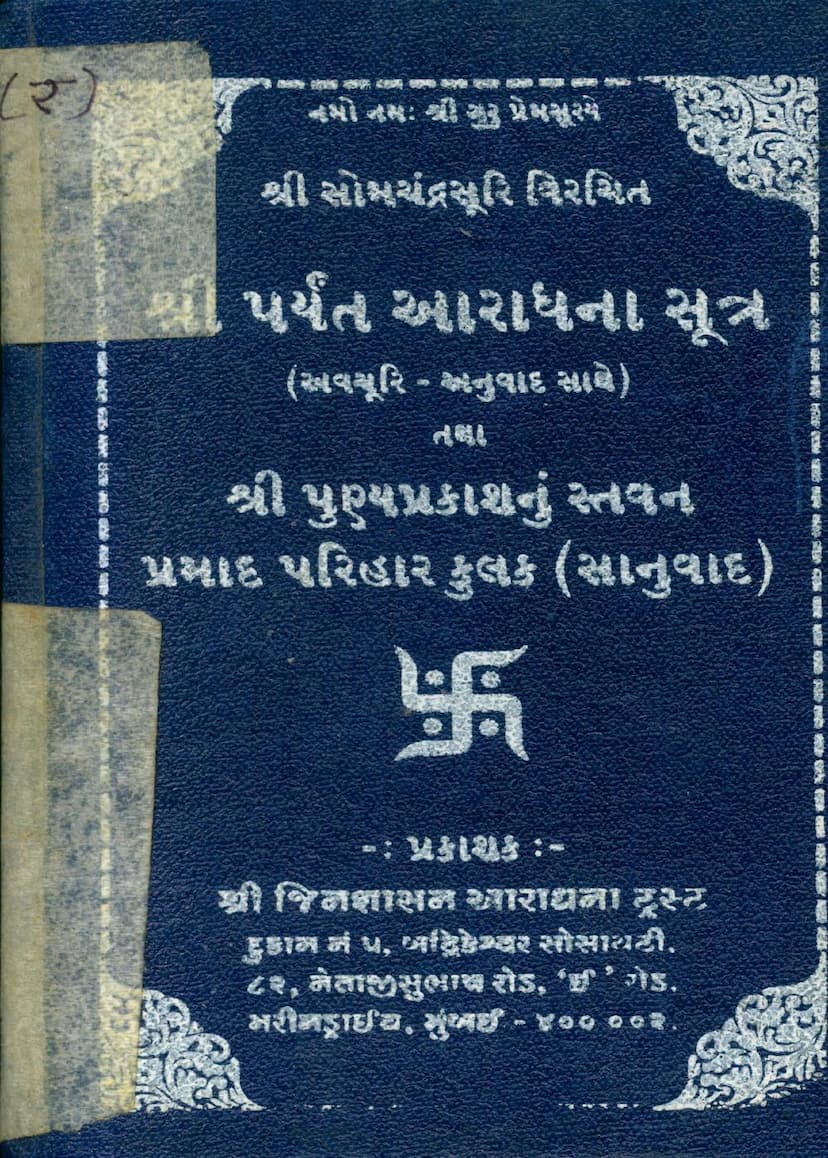Paryant Aradhana Sutra
Added to library: September 2, 2025

Summary
Certainly! Here's a comprehensive summary of the Jain text "Paryant Aradhana Sutra" based on the provided pages, focusing on its core teachings and content.
Book Title: Paryant Aradhana Sutra (End of Life Worship/Devotion Sutra) Author: Somchandrasuri Publisher: Jinshasan Aradhana Trust Catalog Link: https://jainqq.org/explore/005742/1
Overall Summary:
The "Paryant Aradhana Sutra" by Acharya Somchandrasuri is a profound Jain scripture dedicated to guiding individuals on how to prepare for and approach the end of their lives with equanimity, spiritual awareness, and adherence to Jain principles. The text emphasizes the concept of "Pandit Maran" (wise death) or "Samadhi Maran" (peaceful death), which is achieved through a systematic process of self-reflection, purification, and devotion.
The sutra, presented with an explanatory commentary (Avachuri) and translation (Anuvad), outlines a ten-point framework for "Paryant Aradhana" (end-of-life worship/practice). It also includes related texts like the "Punya Prakash Stavana" (Praise of Merit) and "Pramad Parihar Kulak" (Collection for Avoiding Negligence), which complement the central theme of spiritual preparation for death.
Key Themes and Structure:
The "Paryant Aradhana Sutra" guides the practitioner through a series of essential steps to be undertaken as one approaches the end of life. These steps are presented as ten "dwaras" (gates or aspects) of the aradhana:
- Alochan (Confession/Self-Examination): This involves openly confessing and seeking forgiveness for any transgressions (Atichara) committed against the vows (Vrata).
- Vrat Ucchar (Recitation of Vows): Reaffirming and reciting one's vows with sincerity, reinforcing commitment to the spiritual path.
- Jiveshu Kshamasva (Forgiveness for Living Beings): Extending forgiveness to all living beings and seeking their forgiveness, purifying one's karma and fostering peace.
- Vosarisu (Abandoning): Letting go of and abandoning the eighteen "Papasthanas" (places/causes of sin) which hinder spiritual progress and lead to unfortunate rebirths. The text lists these sins, which include violence, falsehood, theft, incontinence, greed, anger, pride, deceit, attachment, aversion, quarrelsomeness, backbiting, slander, etc.
- Chatuh Sharan (Taking Refuge in the Four Shelters): Seeking refuge and solace in the four supreme entities: Arihanta (the liberated beings who have conquered inner enemies), Siddha (the perfected souls), Sadhu (monks), and Dharma (the teachings of the Jinas). This section emphasizes the importance of devotion and contemplation of these beings and principles.
- Dukruta Garhanam (Condemnation of Wrongdoing): Reflecting on and condemning one's past wrongdoings and negative actions with genuine remorse.
- Sukrut Anumodanam (Appreciation of Good Deeds): Encouraging the appreciation and approval of meritorious deeds performed by oneself and others, reinforcing positive karma.
- Shubh Bhavana (Auspicious Thoughts): Cultivating positive and auspicious thoughts, meditating on the virtues of the liberated souls, and maintaining a serene mind, free from worldly attachments and negative emotions.
- Anashana (Fasting/Abstinence from Food): Undertaking fasting or abstaining from food as a means of purifying the body and mind, and as a spiritual practice.
- Pancha Namaskara Smaranam (Remembrance of the Five Namaskaras): Constantly remembering and reciting the Namokar Mantra (Pancha Paramesthi Mantra), which is considered highly auspicious and capable of bestowing spiritual benefits and protection.
Supporting Texts and Concepts:
- Punya Prakash Stavana: This praise, attributed to Acharya Vinay Vijay, highlights the importance of adhering to the five great conduct principles (Jnanachara, Darshanachara, Charitranachara, Tapachara, Viryachara) and confessing any lapses. It further elaborates on the sins related to each of these conduct principles, emphasizing the need for sincere repentance.
- Pramad Parihar Kulak: This collection focuses on the dangers of "Pramad" (negligence or carelessness), which can lead to downfall even for those who have attained spiritual progress. It elaborates on the eight forms of negligence and underscores the importance of vigilant spiritual practice and the consequences of falling prey to these distractions.
Significance of "Pandit Maran" or "Samadhi Maran":
The text strongly advocates for a "Pandit Maran" (wise death) or "Samadhi Maran" (peaceful death). Such a death, achieved through spiritual preparation and awareness, is believed to lead to a good rebirth and ultimately to liberation (Nirvana). It contrasts this with an unintentional or fearful death, which can lead to unfortunate consequences.
Overall Message:
The "Paryant Aradhana Sutra" serves as a practical guide for Jain practitioners to cultivate spiritual discipline and mindfulness, especially as they approach the end of their lives. By systematically addressing past transgressions, reaffirming spiritual commitments, seeking forgiveness, cultivating positive thoughts, and remembering the divine, individuals can face death with courage, peace, and ultimately achieve spiritual liberation. The text underscores that life is precious and opportunities for spiritual growth should not be wasted due to negligence.